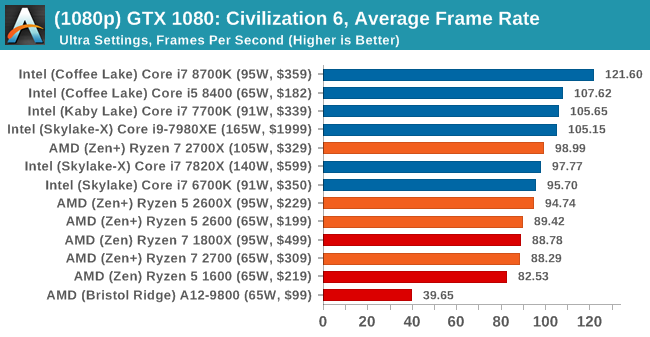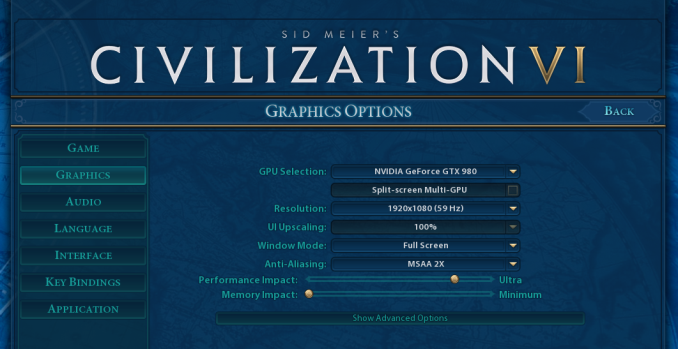The AMD 2nd Gen Ryzen Deep Dive: The 2700X, 2700, 2600X, and 2600 Tested
by Ian Cutress on April 19, 2018 9:00 AM ESTCivilization 6
First up in our CPU gaming tests is Civilization 6. Originally penned by Sid Meier and his team, the Civ series of turn-based strategy games are a cult classic, and many an excuse for an all-nighter trying to get Gandhi to declare war on you due to an integer overflow. Truth be told I never actually played the first version, but every edition from the second to the sixth, including the fourth as voiced by the late Leonard Nimoy, it a game that is easy to pick up, but hard to master.
Benchmarking Civilization has always been somewhat of an oxymoron – for a turn based strategy game, the frame rate is not necessarily the important thing here and even in the right mood, something as low as 5 frames per second can be enough. With Civilization 6 however, Firaxis went hardcore on visual fidelity, trying to pull you into the game. As a result, Civilization can taxing on graphics and CPUs as we crank up the details, especially in DirectX 12.
Perhaps a more poignant benchmark would be during the late game, when in the older versions of Civilization it could take 20 minutes to cycle around the AI players before the human regained control. The new version of Civilization has an integrated ‘AI Benchmark’, although it is not currently part of our benchmark portfolio yet, due to technical reasons which we are trying to solve. Instead, we run the graphics test, which provides an example of a mid-game setup at our settings.
At both 1920x1080 and 4K resolutions, we run the same settings. Civilization 6 has sliders for MSAA, Performance Impact and Memory Impact. The latter two refer to detail and texture size respectively, and are rated between 0 (lowest) to 5 (extreme). We run our Civ6 benchmark in position four for performance (ultra) and 0 on memory, with MSAA set to 2x.
For reviews where we include 8K and 16K benchmarks (Civ6 allows us to benchmark extreme resolutions on any monitor) on our GTX 1080, we run the 8K tests similar to the 4K tests, but the 16K tests are set to the lowest option for Performance.
All of our benchmark results can also be found in our benchmark engine, Bench.
MSI GTX 1080 Gaming 8G Performance
1080p



4K



8K



16K
















545 Comments
View All Comments
DisoRDeR4 - Thursday, April 19, 2018 - link
Thanks for the review, but I noticed a minor error -- your AMD Ryzen Cache Clocks graph on the 3rd page shows data for the 2700X, but in the preceding text it is referred to as the 2800X.IGTrading - Thursday, April 19, 2018 - link
AMD wins all gaming benchmarks, hands down and does this at a real 105W TDP.In my opinion, it is not fair to say that Intel "wins" the single threaded scenarios as long as we see clearly that the 8700 and the 8700K have the "multi-core enhancement" activated and the motherboard allows them to draw 120W on a regular basis, like your own graphs show.
Allow AMD's Ryzen to draw 120W max and auto-overclock and only the would we have a fair comparison.
In the end, I guess that all those that bought the 7700K and the 8700K "for gaming" are now very pissed off.
The former have a 100% dead/un-upgradeable platform while the latter spent a ton of money on a platform that was more expensive, consumes more power and will surely be rendered un-upgradeable soon by Intel :) while AMD already rendered it obsolete (from the "best of the best" POV) or at least the X370+8700K is now the clear second-best in 99% of the tests @ the same power consumption while losing all price/performance comparisons.
IMHO ... allowing the 8700 & 8700K to draw 120W instead of 65W / 95W and allowing auto-overclocking while the AMD Ryzen is not tested with equivalent settings is maybe the only thing that needs to be improved with regards to the fairness of this review.
Thank you for your work Ian!
Luckz - Monday, April 23, 2018 - link
The 2700X draws so much more than its fake on-paper TDP it's not funny. With XFR2 and PB2 of course.PBO can add even more.
Ninjawithagun - Thursday, April 19, 2018 - link
Incorrect comparison. Why does every review keep making the same mistake?? It has nothing to do with price. Comparing like CPU architectures is the only logical course of action. 6 core/12 thread vs 8 core/16 thread makes no sense. Comparing the Intel 8700K 6 core/12 thread @ $347 to the AMD 2600X 6 core/12 thread @ $229.99 makes the most sense here. Once the proper math is done, AMD destroys Intel in performance vs. cost, especially when you game at any resolution higher than 1080P. The GPU becomes the bottleneck at that point, negating any IPC benefits of the Intel CPUs. I know this how? Simple. I also own a 8700K gaming PC ;-)SmCaudata - Thursday, April 19, 2018 - link
I'd like to see more scatterplots with performance versus cost. Also, total cost (MB+CPU+cooler if needed) would be ideal. Even an overall average of 99th percentile 4k scores in gaming (one chart) would be interesting.... hmmm maybe a project for the afternoon.Luckz - Monday, April 23, 2018 - link
The English-language version of the Tomshardware review has a million plots on the last page (14). 4K is complete irrelevant for plotting though since you're GPU-limited there.Krysto - Thursday, April 19, 2018 - link
Wrong. Performance at a given price level is absolutely a metric chip buyers care about - if not the MOST important metric.People usually think "Okay, I have this $300 budget for a CPU, which is the best CPU I can get for that money?" - It's irrelevant whether one has 4 cores or 8 cores or 16 cores. They will get the best CPU for the money, regardless of cores and threads.
Compared core vs core or thread vs thread is just a synthetic and academic comparison. People don't actually buy based on that kind of thinking. If X chip has 15% better gaming performance than the Y chip for the same amount of money, they'll get the X chip, regardless of cores, threads, caches, and whatnot.
Ninjawithagun - Thursday, April 19, 2018 - link
Incorrect. Cost vs. Cost is only one of many factors to consider, but is not a main one, especially if the competition has a processor of equal quality for much less cost. Comparing an Intel 6 core/12 thread CPU to an AMD 8 cores/16 thread CPU makes absolutely no sense if you are measuring cost vs. performance. Your argument makes no sense, sorry.fallaha56 - Thursday, April 19, 2018 - link
Ok by your rationale we should compare Threadripper to 8700k tooNinjawithagun - Thursday, April 19, 2018 - link
Now you are just being stupid.